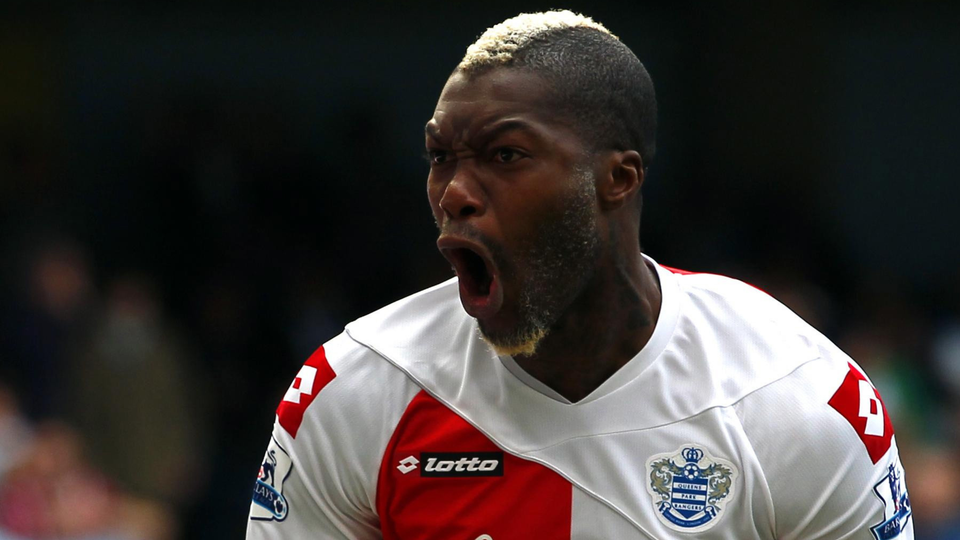Djibril Cisse Celebrated When Man City Won 2012 Premier League – Here’s Why

The story of Manchester City’s first Premier League title in 2012 is one of the most memorable, controversial, and dramatic moments in football history, a tale that has been retold countless times, but few have really understood the tension, the emotion, and the human side of what happened that day. The Etihad Stadium was a cauldron of noise, color, and anticipation. Fans had waited for decades for this moment, decades of dreaming, hoping, suffering, and believing that City could finally take their place among the giants of English football. The 2011-12 season had been a rollercoaster, a journey full of highs, lows, controversies, and heart-stopping moments. Every match mattered, every point counted, and as the season neared its climax, every football fan knew that what happened in Manchester on that final day would be remembered forever.
Djibril Cisse, the French striker who was playing for Queens Park Rangers at the time, had no idea that he would be at the center of one of the most controversial images in Premier League history. Cisse had joined QPR with a mission: to help the team survive relegation. The club had struggled all season, fighting against the drop, feeling the pressure from every angle, knowing that failure would mean heartbreak, humiliation, and a massive shake-up in the squad. Yet Cisse, with his experience, talent, and personality, brought energy, hope, and determination to a team desperate for survival. QPR’s goal was simple: stay in the Premier League. Everything else was secondary, including what happened at the top of the table.
The final day of the season was a tense affair. Manchester City needed a win against QPR to secure their first Premier League title since the league’s formation in 1992. The context was insane. City were trailing 2-1 for most of the match, and every second felt like eternity. On the other side, QPR were fighting for survival, knowing that even a point could secure their safety if other results went their way. The stadium was alive with tension, fans on the edge of their seats, players sweating, coaches shouting, and the air buzzing with the knowledge that history was being written. Every pass, every tackle, every movement mattered.
Then came the moment that would be etched in memory forever. In the dying seconds of the game, Sergio Aguero, a hero in the making, scored the most famous goal in Premier League history. The ball hit the back of the net, and time seemed to stop. The stadium erupted. Fans poured onto the pitch. Players hugged, cried, laughed, and celebrated. It was pure, raw emotion. City had won their first Premier League title in the most dramatic fashion possible. But amidst the chaos, cameras caught something unusual. QPR players, including Djibril Cisse, were seen celebrating on the pitch. The image of Cisse dancing alongside Samir Nasri, a friend of fifteen years, became iconic. Fans, pundits, and critics were confused. Why were the QPR players celebrating a defeat? Why were they seemingly happy for Manchester City? The moment became the center of conspiracy theories that have lasted more than a decade.
Wayne Rooney, a legend of Manchester United, later admitted that he felt the situation was dodgy. He questioned whether QPR had deliberately helped City win the title, suggesting that the outcome might have been influenced by the fact that QPR were safe from relegation thanks to other results. Joey Barton, a former City player, had been sent off during the game, adding another layer to the drama. Rooney believed that Barton’s history with City may have influenced his behavior on the pitch, perhaps indirectly assisting Aguero and the team. Mike Dean, the referee on the day, also remarked on the strange behavior after the equalizer. QPR, knowing they were safe, kicked the ball straight back to City immediately after the kick-off, an act that seemed bizarre to everyone watching. Fans debated, speculated, and argued endlessly. Newspapers ran headlines suggesting collusion, unfair play, and even conspiracy. Social media exploded with threads dissecting every second of the match.
But Djibril Cisse was tired of the speculation. For years, people had questioned his intentions, his actions, and the reasons why he celebrated alongside Nasri. Finally, he decided to set the record straight. Cisse explained that he was simply celebrating a personal moment with a friend, someone he had known for fifteen years. He was happy that QPR had stayed up. He was relieved that the team’s struggle to avoid relegation had ended. He had no interest in helping Manchester City win the league. He stated clearly that if QPR wanted City to win, they would have let the ball roll, they would have conceded more goals, but they didn’t. Cisse emphasized the effort his team had put in, the fight they had shown on the pitch, and that Manchester United’s failure to win the title was due to their own dropped points over the season. It wasn’t his fault, or QPR’s fault, or anyone else’s. Football, he reminded, was unpredictable, chaotic, and sometimes cruel.
The human element of this story is what makes it so powerful. Cisse was not just a player on the field; he was a human being, a professional athlete, a man navigating friendship, loyalty, and career simultaneously. Samir Nasri was his friend, and sharing that joy was natural. The game had delivered a rollercoaster of emotions for everyone involved. Players, coaches, fans, and pundits all experienced something unforgettable that day. City players celebrated years of hard work, long nights, careful planning, and strategic brilliance. QPR players celebrated survival, relief, and the sheer joy of avoiding relegation. And Djibril Cisse became the symbol of a moment that was misinterpreted, misunderstood, and mythologized.
The broader football world was quick to latch onto the drama. Conspiracy theories flourished. Pundits argued endlessly about ethics, fairness, and intent. Social media posts dissected player movements, minute-by-minute analysis of each kick, tackle, and pass. Wayne Rooney’s comments only fueled the fire. The idea that a team could help another team win a title was explosive, controversial, and irresistible to the media. Fans created memes, debates, and online discussions that persist even more than a decade later. Yet amidst the noise, the truth remained simple: football is unpredictable, emotions are raw, and human behavior cannot always be rationalized.
Cisse’s explanation added nuance to a story that had often been sensationalized. Celebrating with Nasri was not about aiding City; it was about personal connection, relief, and joy. He reminded everyone that QPR had fought valiantly, that they had a strong squad, and that the responsibility for United’s failure was not on his shoulders or on QPR. Football, as always, is a collective effort, full of complexities, surprises, and human stories that defy simple explanation. Cisse’s words were a reminder that not everything on the pitch is about manipulation or conspiracy; sometimes it’s about friendship, emotion, and shared history.
The memory of that day is unforgettable. Aguero’s goal, the fans storming the pitch, the chaos, the celebrations, the controversy, all of it has become legend. Cisse dancing with Nasri remains an iconic image, representing the unpredictable, emotional, and human side of football. It reminds fans that players have lives, friendships, and personal motives beyond the obvious narratives. It challenges assumptions, invites reflection, and highlights the complexity of competitive sport. Football is not just a game; it’s a stage for drama, emotion, and human storytelling.
Even years later, the incident sparks debates. Every time Manchester City’s first Premier League title is mentioned, the memory of QPR players celebrating, the speculation, the conspiracy theories, and Cisse’s clarification resurfaces. Fans, pundits, journalists, and former players continue to discuss the nuances. It’s part of football folklore, a lesson in perception versus reality, intention versus interpretation. It demonstrates how a single moment can be immortalized, distorted, and analyzed endlessly.
The 2012 season, the final match, and the moments after the whistle remain some of the most extraordinary in Premier League history. Cisse’s explanation humanizes the story, providing context, perspective, and clarity. It shows that behind every headline, there is a human story, emotions, relationships, and decisions that are rarely black and white. Celebrating survival, friendship, and relief does not equate to manipulation, cheating, or conspiracy. It’s about the human experience on one of football’s biggest stages.
Cisse’s honesty and clarity allow football fans to appreciate the moment in its full complexity. The final seconds of the game, Aguero’s legendary goal, the chaos on the pitch, the reactions of players, fans, and officials—all combine into a narrative that transcends sport. It’s about joy, heartbreak, emotion, and the unpredictability of life. QPR’s survival, City’s triumph, United’s disappointment, and Cisse’s personal celebration weave together into a story that is unforgettable, dramatic, and deeply human.
Football has always been more than scores, tables, and trophies. It’s about stories, characters, relationships, and moments that define generations. The 2012 Premier League finale exemplifies this, demonstrating that even in competition, there is room for friendship, emotion, and humanity. Cisse’s words provide clarity, perspective, and closure to a moment that was misunderstood, turning a controversial scene into a testament of friendship, relief, and human emotion.
Every time fans watch footage of that day, the image of Djibril Cisse celebrating alongside Samir Nasri evokes laughter, surprise, and reflection. It reminds us that football is unpredictable, emotions are complex, and players are human. The story teaches lessons about assumptions, context, and the depth behind every moment on the pitch. Conspiracies may entertain, debates may rage, but the truth, as always, is often simple, heartfelt, and profoundly human.
That day, that goal, that celebration, and that explanation are now permanently etched in Premier League history. Djibril Cisse, Samir Nasri, Manchester City, QPR, Wayne Rooney, and every fan who witnessed the drama became part of a story larger than any one club or player. It’s a reminder of why football is beloved worldwide: the emotion, the unpredictability, the human stories, and the moments that transcend sport and enter the realm of legend. The Etihad Stadium, 2012, Aguero’s goal, the celebrations, and Cisse’s honesty will always be remembered, debated, and cherished as part of football folklore that defines the beauty, drama, and humanity of the game














